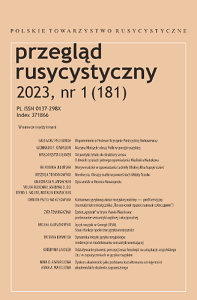Безэквивалентные лексические едининцы в преподавании русского языка как иностранного в сопоставлении с немецким и польским
Non-equivalent lexical units in teaching Russian as a foreign language in comparison to German and Polish
Author(s): Wojciech Paweł Sosnowski, Svetlana AhlbornSubject(s): Foreign languages learning, Western Slavic Languages, Eastern Slavic Languages, Philology, Translation Studies
Published by: Polskie Towarzystwo Rusycytyczne
Keywords: non-equivalent lexis; Russian as a foreign language; Russian-Polish-German parallel corpora; translation matters; culture-specific words;
Summary/Abstract: Any natural language contains several lexical units that do not have equivalents in other language systems. In certain languages, we can observe linguistic units that have a cultural background, as they are associated with the history, customs, and experience of a given people and their linguistic imagery of the world. These units are especially noticeable when we compare any languages, compile bilingual and multilingual phraseological or explanatory dictionaries, teach foreign languages or do translation work. In our study, using Russian-language educational materials, language intuition, and corpus data, we collected, analyzed, and classified examples of lingua-specific words and expressions for which due to linguistic realities there are non-translational communicative correlates in German and Polish. Our observations could be of interest not only for researchers and teachers but also for foreign language learners.
Journal: Przegląd Rusycystyczny
- Issue Year: 2024
- Issue No: 185
- Page Range: 220-240
- Page Count: 21
- Language: Russian

